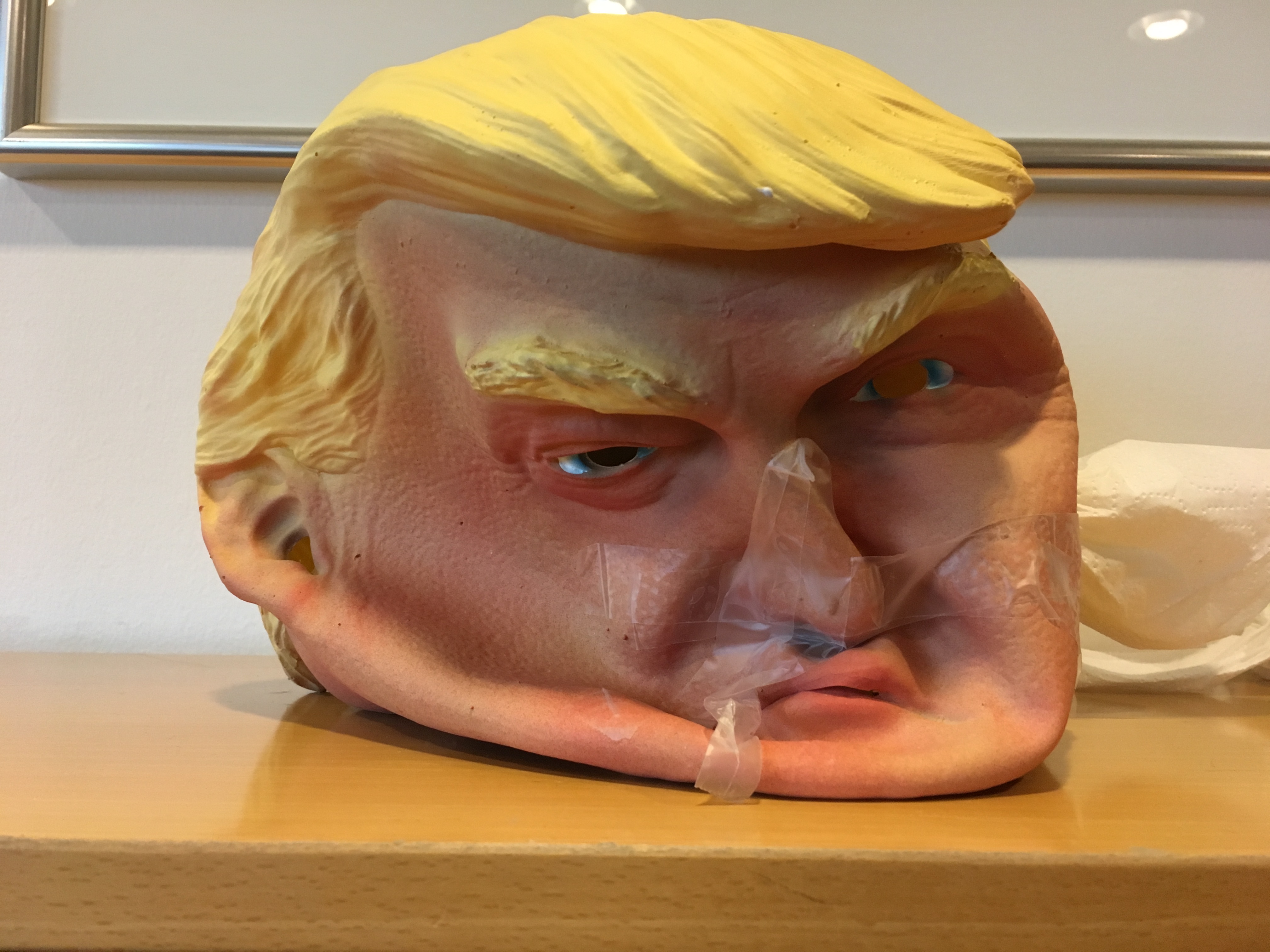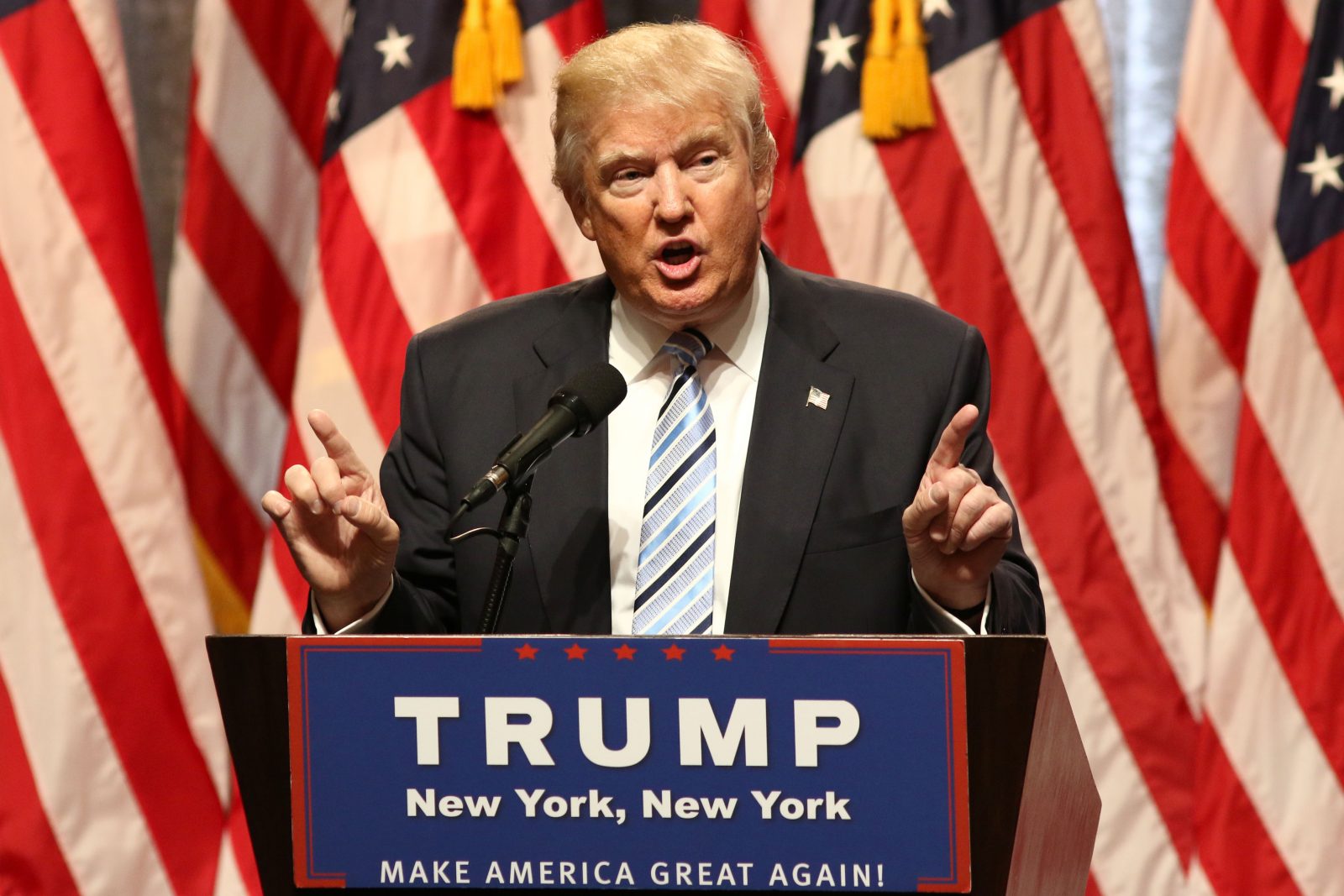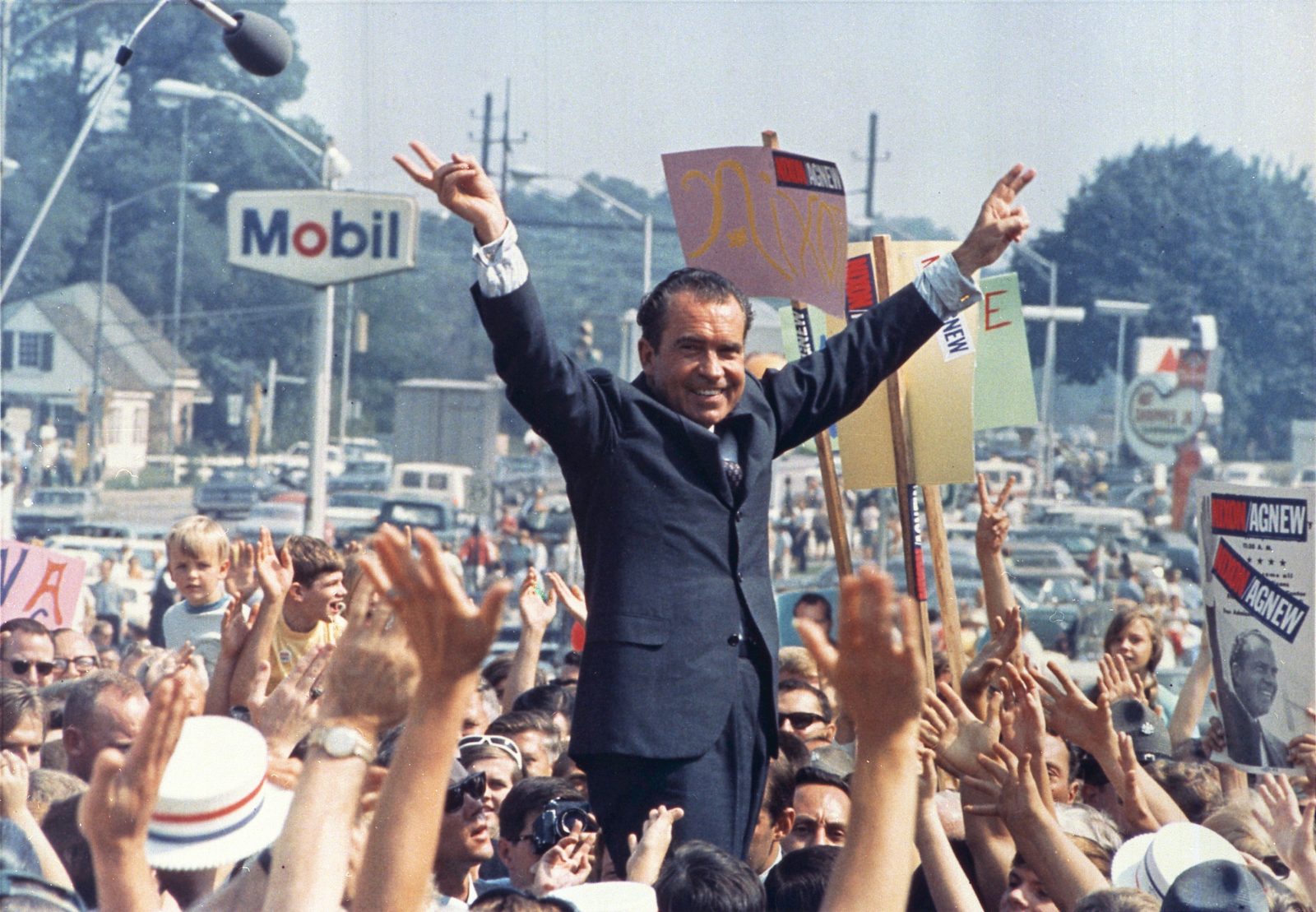Get over it – Trump is here to stay (for quite a while)

Can Trump explain the decreases in the number of 1.priority applications to the BSc in International Business Asia? (Photo: Anne M. Lykkegaard)
Donald Trump’s presidency seems to have been in crisis from day one and there is already talk of impeachment. But, according to Associate Professor Edward Ashbee, we have to get ready for a long and bumpy with The Donald.
Donald Trump’s shock victory in November 2016 left many European commentators and much of the public aghast. The vision of American carnage in his inaugural address and the telling phrase “.. from this day forward, it’s going to be only America First” did little to allay fears.
Although he only secured the White House because of quirks in the electoral system, Trump had of course far greater support in the US. Nonetheless, he was not accorded the traditional presidential ‘honeymoon’ and instead his ratings slumped. As of late March, Gallup placed his job approval at 39 per cent.
By way of comparison, Barack Obama’s figure at the same early point in his presidency was 63 per cent.
Presidential backlash
There are some very obvious reasons for Trump’s rocky standing. There is little or no policy coherence and there have been repeated reports of tensions within the White House as the president’s courtiers jostle for position.
The bitterly vituperative style that characterized the election campaign continued when Trump took office. Critical accounts of life in the White House have invariably been dubbed “fake news” and press secretary Sean Spicer’s daily encounters with journalists as he seeks to defend seemingly contradictory claims have become prime-time entertainment.
They entertain hopes that Trump will tire of the White House, play more golf, watch more television and eat more chocolate cake
Edward Ashbee, Associate Professor
Although the House of Representatives eventually passed a health reform package designed to gut Obamacare there is little sign that major legislative reforms can be enacted before members of Congress begin to focus their attention on the 2018 mid-term elections.
Amidst evident relief President Trump’s visit to the Middle East appeared to proceed with major incident. Nonetheless, earlier meetings with foreign leaders, when not abandoned, proved awkward and largely unproductive and important foreign policy shifts (and sometimes shifts back again) seemed to be triggered by sudden impulse.
All of this has been compounded by miscalculations, unfounded assertions and the incessant unpredictability of the night-time tweet. The appointment of former FBI Director Robert Mueller as special counsel to investigate possible ties between Trump’s presidential campaign and the Russian government might well unleash a dynamic that could have far-reaching consequences.
Given all of this, the prospects of Trump completing a four year term of office, let alone two terms, do not look very good.
When will Trump grow tired of being president?
Certainly Trump’s many critics are desperate to seize upon any opening.The word “impeachment” has been repeatedly murmured. Some have toyed with the 25th Amendment to the Constitution which provides opportunities to dislodge a president who “.. is unable to discharge the powers and duties of his office.

The murmerings are certainly not confined to Democrats or those the president dubs “paid agitators”. Although the new administration has embraced some long-established Republican policies, many Congressional Republicans remain fearful of, and at times horrified by, the new president. Despite their cautious expressions of public support for Trump, they would greet Mike Pence’s assumption of the presidency with unbridled joy.
They certainly entertain hopes that Trump will tire of the White House, play more golf, watch more television and eat more chocolate cake thereby leaving the serious business of governing to the professionals.
Nonetheless, all the critics whether drawn from the right or left are likely to be disappointed.
Syria and North Korea strengthens Trump
Given the intensity of grassroots partisan sentiments and the loyalty of his personal base the president’s poll ratings may sink further, but probably not that much further.
Indeed, there were some signs of an uptick following the missile attack on Syria and as North Korea came into the crosshairs. The Trump White House suddenly seemed resolute whereas the Obama White House had repeatedly dithered.
While his hardcore base will not want a return to the nation-building ventures associated with the Bush years they certainly favour tough military action. The seeming change of course also put some distance between Trump and the Russian government.
Republicans owe their success to Trump
At the same time, the Republicans are more than aware that they owe the political opportunities they have now been given to the successes of the Trump campaign insofar as he won the support of white manual workers in the north-eastern rustbelt states for the Republican ticket where earlier standard-bearers such as Senator John McCain or Mitt Romney had failed.
More importantly, there are some perhaps perverse or unintended signs that “Trumpism” is working at least up to a point
Edward Ashbee, Associate Professor
Fourteen per cent of whites without a college degree who had voted for Obama in 2012 switched sides and backed Trump four years later. And, whatever their misgivings, nearly all traditional Republican voters “came home” to their party and pulled the lever for Trump on election day.
There may well be provocations and clashes but very few leading Republicans will want to cast aside their most successful vote-getter in years.
Face the potentially dangerous and irrational boss
More importantly, there are some perhaps perverse or unintended signs that “Trumpism” is working at least up to a point. This is because Trump’s highly unpredictable personality may have an upside.
Charles Krauthammer, the syndicated columnist, has pointed out that the “madman” approach to policymaking served President Richard Nixon rather well.
Dr Henry Kissinger, his National Security Advisor and Secretary of State, was able to court and threaten foreign adversaries and allies by saying, in effect, that unless they acceded to his demands they would have to face his potentially dangerous and less than rational boss.
There are some signs that some Trump appointees are able to do much the same thing.
The Democrats are in trouble
Trump and his Republican allies have something even more important going for them. The Democrats are in disarray and have no obvious route to recovery.

While there are those who claim that once the hollow falsity of Trump’s campaign promises becomes evident, his blue-collar voters will desert him and re-embrace the Democratic Party, there is little to support this.
The Democrats’ problems go way beyond the task of finding a credible presidential candidate. Their difficulties lie not so much in politics but in political economy.
They can talk about helping disadvantaged groupings but they cannot credibly promise bring back the mass ‘heavy’ manufacturing and extractive industries that once sustained the north-eastern states.
Hero of the ‘rustbelt’
Over the last few decades the ‘rustbelt’ region has been doomed by automation and globalizing processes. Male workers whose fathers and grandfathers once earned sufficient to meet the needs of an entire family now face the prospect of, at most, irregular low-paid employment in the service sector.
Because of productivity advances US manufacturing now requires far fewer workers.
Faced by relentless economic decline and its effects upon those in routine and unskilled forms of employment, sections of the the white working-class turned to Trump. Polling data suggest that such voters were, at heart, seeking re-admission to the ranks of those who have secure jobs. That was once their heritage.
Often, these Trump voters have little but disdain for the redistributory government programmes with which the Democrats are, fairly or unfairly, associated. The resent reforms that seem to extend a helping hand to minorities jeopardize their already enfeebled position.
There is a long line of potential scapegoats if the going gets rough. Donald Trump isn’t going anywhere any time soon
Edward Ashbee, Associate Professor
In contrast, a robust protectionist message, the promise of economic nationalism and a commitment to rebuild the hardest-hit regions has already proved to be a vote-winner.
Policy zigzags and a bag full of scapegoats
The chances are that the president will fail to deliver on his promises or at least those targeted at lower-income voters. But can Trump get away with this? The answer is that he is probably better-placed than many to withstand the consequences of non-delivery.
He has a fair bit of latitude. Despite the bombastic claims that he would make the country “great again”, Trump was not elected because of his pledges and commitments. Instead, he won support because he appeared to be a “strong man” echoing the style of Recep Tayyip Erdoğan or perhaps Vladimir Putin.
Unlike all the other contenders for office, he held out the prospect that he could and would cut across the long-winded deliberations and endless bartering processes demanded by the US system of government.
It is an image that has a strong appeal and immense resonance amongst those who back him. The political system has failed them over many decades. Thus Trump can almost certainly get away with countless policy zigzags and the constant whiff of scandal. And it is an image that enables him to deride his opponents as the purveyors of lies and willful obstructionists.
There is a long line of potential scapegoats if the going gets rough. Donald Trump isn’t going anywhere any time soon.

































































































































Comments